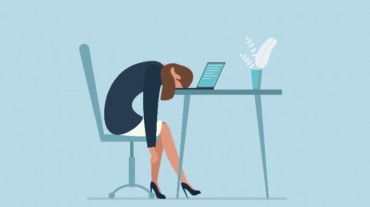
Working from home isn’t that easy as we thought before. From taking more responsibilities to working for more than the working hours, the line between personal and professional life has been blurred which is creating even more stress. And stress in any dimension of your life is not good for your health.
You might have known that work stress can burn you out, but did you know that the vice-versa is also possible? Because, burnout puts more stress on people! Professor Christian Dormann of Johannes Gutenberg University Mainz says, “This means that the more severe a person’s burnout becomes, the more stressed they will feel at work, such as being under time pressure, for example.”
Therefore it is suggested that the employees suffering from burnout should be provided with adequate timely support in order to break the vicious circle between work stress and burnout.
Symptoms of burnout include exhaustion, cynicism, and reduced performance
“The most important burnout symptom is the feeling of total exhaustion – to the extent that it cannot be remedied by normal recovery phases of an evening, a weekend, or even a vacation,” said Dormann.
“To protect themselves from further exhaustion, some try to build a psychological distance to their work, that is, they alienate themselves from their work as well as the people associated with it and become more cynical,” added Dr Christina Guthier.

The study recently published in the journal Psychological Bulletin studied 26,319 participants and the average age in the initial survey was about 42 years. About 56% of the respondents were women. The study was conducted over a period of 23 years from 1986 to 2019, across various countries, including predominantly European countries as well as Israel, the USA, Canada, Mexico, South Africa, Australia, China, and Taiwan.
Also, read: Work from home burnout exists and your virtual meetings are to blame for it
Stopping the downward spiral and reducing the effect of burnout on work stress
The results challenge or at least relativize, the common perception that work stress is the driving force behind burnout. “Burnout can be triggered by a work situation, but that is not always the case,” Dormann said.
Select Topics of your interest and let us customize your feed.
PERSONALISE NOWOnce burnout begins, it develops only very gradually, building up slowly over time. Ultimately it leads to work being increasingly perceived as stressful: The amount of work is too much, time is too short, and work stress is too great.
“When exhausted, the ability to cope with stress usually decreases. As a result, even smaller tasks can be perceived as significantly more strenuous,” said Guthier, the author of the article. “We expected an effect of burnout on work stress; the strength of the effect was very surprising,” she noted.
The effect of burnout on perceived work stress can be somewhat mitigated if employees have more control over their own work and receive support from colleagues or superiors. According to Dormann, a new research area is emerging on the basis of this unique data because the strong boomerang effect of burnout on work stress has not yet been investigated.
Key questions that need to be addressed are: how can the effects of burnout on perceived work stress be reduced and how can the development of this vicious circle be prevented? Dormann and Guthier suggest that the place to start is with management behaviour. Employees should have the opportunity to give feedback on their work stress at any time and be appreciated. Last but not least, proper recovery could also help to stop the downward spiral.